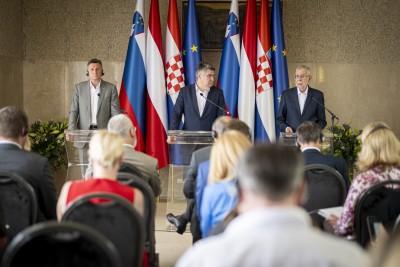Trilateral Presidential Meeting Between the Presidents of Austria, Croatia and Slovenia
Austrian Federal President Alexander Van der Bellen met with his counterparts from Croatia and Slovenia, Zoran Milanovic and Borut Pahor, in Croatia for the traditional triennial meeting. The focus is on the Euro-Atlantic integration of the Western Balkans, as well as the impact of the Russian war in Ukraine.
 The Presidents of Slovenia, Borut Pahor (l.), Croatia, Zoran Milanovic (m.) and Austria, Alexander Van der Bellen (r.). / Picture: © www.bundespraesident.at / Carina Karlovits / HBF
The Presidents of Slovenia, Borut Pahor (l.), Croatia, Zoran Milanovic (m.) and Austria, Alexander Van der Bellen (r.). / Picture: © www.bundespraesident.at / Carina Karlovits / HBF
Croatian President Zoran Milanovic, as this year's host, has invited his counterparts to the Brijuni Islands in Istria. The talks will focus on the war in Ukraine as well as the situation in the countries of the Western Balkans and Eastern Europe and their EU perspective.
The war in Ukraine and the European perspective of the Western Balkan countries were the focus of the meeting of the heads of state of Austria, Croatia and Slovenia on the Brijuni Islands in Croatia on Friday.
The heads of state demonstrated unity in condemning Russian aggression against Ukraine, but at the same time powerlessness to find solutions to end the war soon.
In his address, President Van der Bellen emphasized that the trilateral had become part of the tradition.
"The war has been raging for 100 days today, and we all hope that it will not continue for 100 days. But we don't know how to speed it up," Federal President Alexander Van der Bellen said at a joint press conference with his two counterparts, Borut Pahor and Zoran Milanovic.
The three presidents discussed aid measures to help Ukraine and sanctions against Russia, Alexander Van der Bellen said, adding that EU countries had so far shown "remarkable unity" on sanctions. "It is important, also vis-à-vis the aggressor, that we do not allow ourselves to be divided in the European Union in this situation," he stressed.
"We condemn Russian aggression, but everything else is out of our hands," said the host of this year's annual meeting, Croatia's President Milanovic. "We cannot change anything, only hope that the war will end as soon as possible," he said. His Slovenian counterpart, Pahor, currently sees "no possibility of finding a way for a diplomatic solution to the conflict. At least not at this moment," Borut Pahor said.
In the war situation in Ukraine, one should not lose sight of the countries of the Western Balkans, President Van der Bellen warned.
The EU accession processes of these countries, which according to President Van der Bellen have been dragging on for too long, must be put on a new footing and the EU enlargement policy in the Western Balkans must be redesigned.
Referring to the sluggish accession process of the Western Balkan countries, he said that there was "too much small talk" in the EU. "All six countries of the Western Balkans belong in the European Union," President Van der Bellen stressed.
Slovenia's president stressed that he has been pointing out for years that the EU enlargement of the Western Balkans is a geopolitical issue.
This has now become evident with the war in Ukraine, Borut Pahor said, referring to the fact that Ukraine's EU membership was not really in focus until the war. "A European perspective is the only lasting assurance of peace and security in the Western Balkans," President Pahor stressed, warning that delays in enlargement could open the way for nationalist politics.
Regarding Bosnia-Herzegovina, Borut Pahor argues that the country should be granted candidate status immediately and could meet the necessary conditions later.
The EU should do that "in good faith," the president of Slovenia said. "Bosnia and Herzegovina could thus get out of the vicious circle without any progress and without status," Borut Pahor expressed his conviction.
Thank you, President Milanović @Ured_PRH, dear Zoran, for hosting this year's trilateral meeting on the beautiful Brijuni Islands. The relations between Croatia and Austria are very dense and friendly – the best foundation to build on. (vdb) pic.twitter.com/z2haGCPYXk
— A. Van der Bellen (@vanderbellen) June 2, 2022
Alexander Van der Bellen welcomed Pahor's initiative. "We have to come up with new ideas on how to accelerate the rapprochement with the EU, otherwise frustration will take hold there, not only among politicians but also among the affected population. It will be even harder to correct that then," the president warned.
"I've been talking about this for years - the Western Balkans, but Bosnia and Herzegovina in particular, is slipping out of focus," the Croatian president also stressed, criticizing the fact that the majority of EU heads of state and government have "no idea" about the region. The task of Croatian diplomacy is to point out the problems, Milanovic said.
President Milanovic gave his support to the countries of the Western Balkans for the continuation of the negotiation process that has already begun in the case of Serbia and Montenegro, as well as for the start of negotiations between Northern Macedonia and Albania.
In this context, he defended his position, with which he has repeatedly caused a stir, such as his demand that Sweden and Finland block NATO accession until the problem with electoral reform in Bosnia is solved. "Everything I do has a clear goal. Not to defy someone, for example, Sweden and Finland, but to help those who cannot get help in any other way," he said. "Ignorance and lack of interest among those who can make a difference hurts me," Zoran Milanovic said.
Presidential Chancellery of Austria



